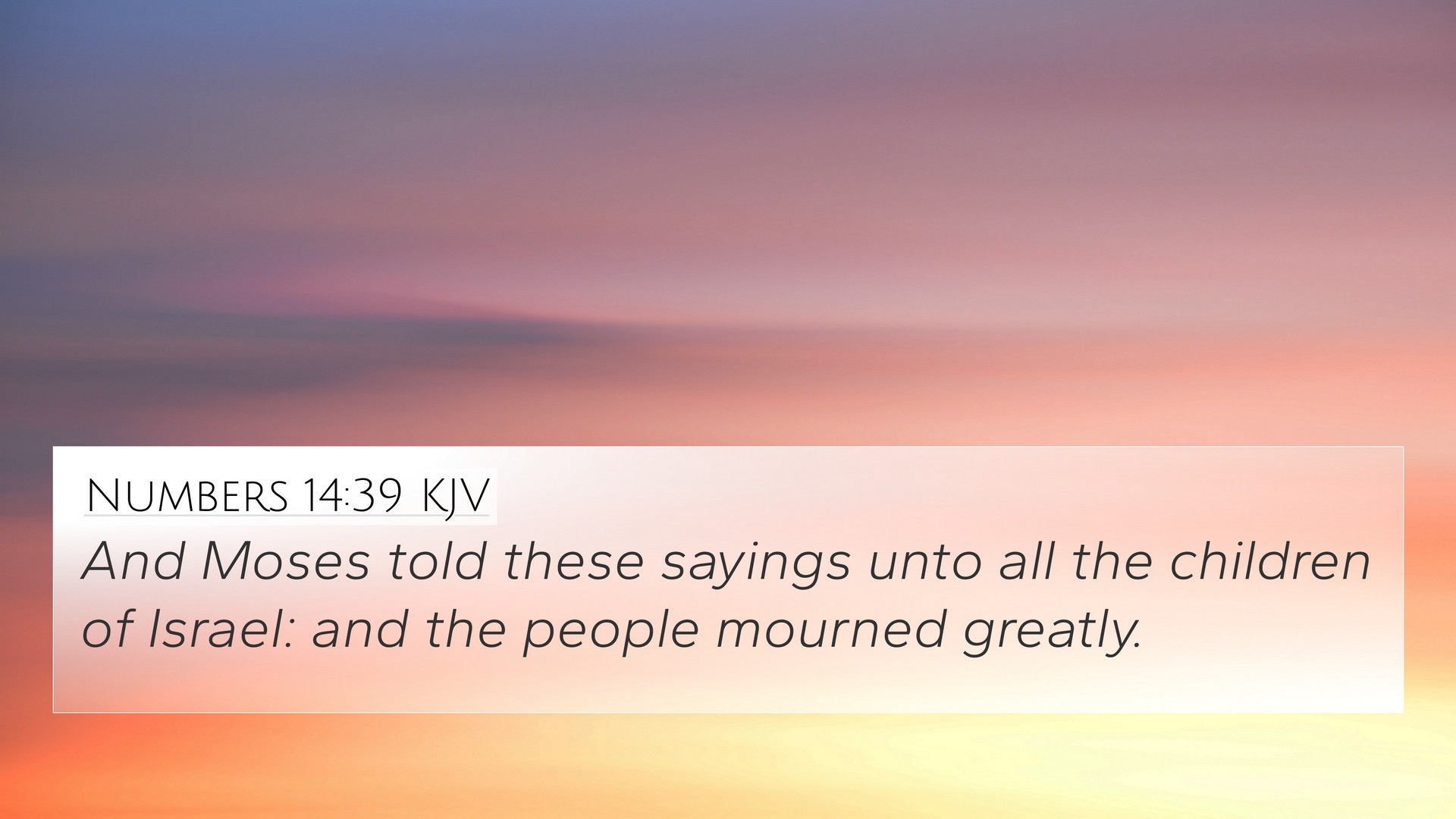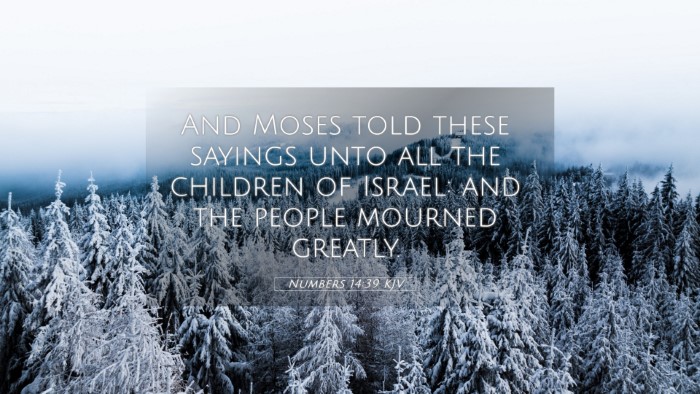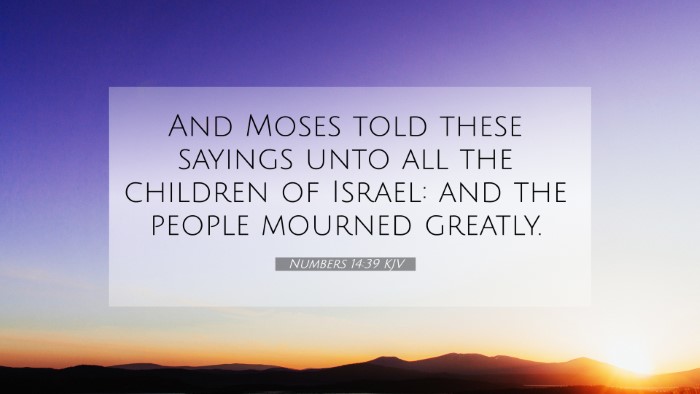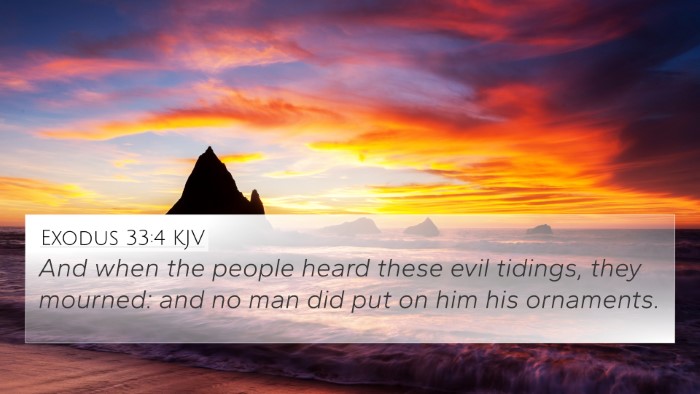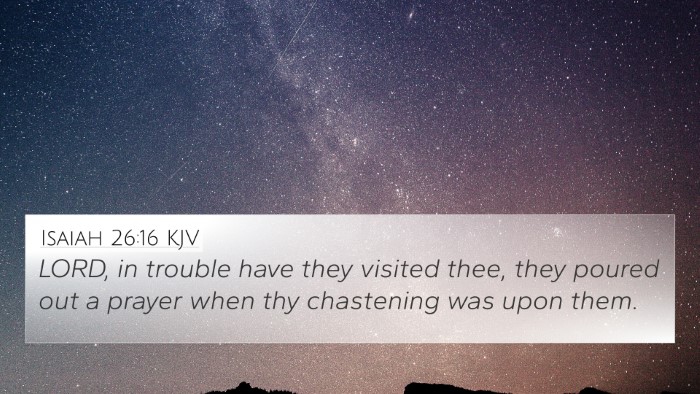Understanding Numbers 14:39
Verse: Numbers 14:39 (KJV) - "And Moses told these sayings unto all the children of Israel: and the people mourned greatly."
Introduction
This passage reflects a moment of deep regret and emotional turmoil for the children of Israel following their disobedience and lack of faith in God's promises. This commentary seeks to provide insights from the writings of Matthew Henry, Albert Barnes, and Adam Clarke, summarizing their views on the meaning and implications of this verse.
Summary of Insights
- Matthew Henry: Henry emphasizes the significance of Israel's mourning as a wake-up call. He notes that their grief was a result of their acknowledgment of sin, expressing their sorrow over their rebellion against God. This verse illustrates repentance and the pivotal role of leadership in communicating God's directives.
- Albert Barnes: Barnes points out that the people's mourning indicates their recognition of their error in rejecting spies' reports and turning away from God's promises. He remarks that their grief signifies not just regret but also the fear of the consequences of their actions, marking an essential step toward redemption.
- Adam Clarke: Clarke interprets the mourning of the Israelites as both an emotional and spiritual response to the realization of their impending doom. He connects this sorrow with the theme of divine justice, underscoring that God's judgments are rooted in His covenant promises.
Cross-Referencing Related Verses
When exploring the themes in Numbers 14:39, several Bible verses come to mind that highlight similar themes of disobedience, remorse, and redemption:
- Exodus 32:30-32: Moses pleads for the people's sins, illustrating intercession and the gravity of rebellion.
- Deuteronomy 1:26-28: Discusses the people's fear and refusal to enter the Promised Land, leading to their punishment.
- Psalm 51:17: "The sacrifices of God are a broken spirit; a broken and contrite heart, O God, you will not despise," reflecting true repentance.
- Hebrews 3:12-19: Warns against unbelief, drawing parallels with the hard-heartedness of the Israelites.
- Romans 10:1: Paul's desire for Israel’s salvation parallels the emotional turmoil of the Israelites.
- Matthew 26:75: Peter’s weeping after denying Christ mirrors Israel's regret.
- 2 Corinthians 7:10: Highlights the godly sorrow that leads to repentance, similar to Israel's remorse.
Thematic Connections and Analysis
Numbers 14:39 serves as a poignant reminder of the consequences of disobedience. The collective mourning of the Israelites signifies a turning point; their recognition of sin is essential for spiritual growth. This concept finds resonance throughout the Scriptures, emphasizing the importance of repentance and the hope for restoration.
Cross-Referencing Tools and Resources
For better understanding and cross-referencing related biblical texts, the following resources can be useful:
- Bible Concordance: A tool for finding precise verses and their meanings.
- Bible Cross-Reference Guide: Offers insights into thematic and narrative links between verses.
- Cross-Reference Bible Study: Methods for engaging with the text through interconnected scriptures.
- Bible Reference Resources: Comprehensive materials to assist in deeper biblical studies.
- Bible Chain References: Help in linking passages through thematic connections.
Conclusion
Numbers 14:39 encapsulates a crucial moment of realization for the people of Israel. The heart of this passage focuses on the themes of remorse and the consequences of disbelief. By utilizing tools for Bible cross-referencing and embracing the themes illustrated throughout Scripture, one can gain deeper insights into the messages that God imparts through His Word.
Further Study Suggestions
- Identifying connections: Engage with verses that highlight obedience and the ramifications of sin.
- Exploring parallels: Study how this mourning relates to other instances of corporate repentance in the Bible.
- Comparative studies: Examine themes of judgment and grace across both Old and New Testaments.
This exploration of Numbers 14:39 encourages believers to reflect on their own faith and relationship with God, emphasizing the transformative power of recognizing and repenting from sin.
